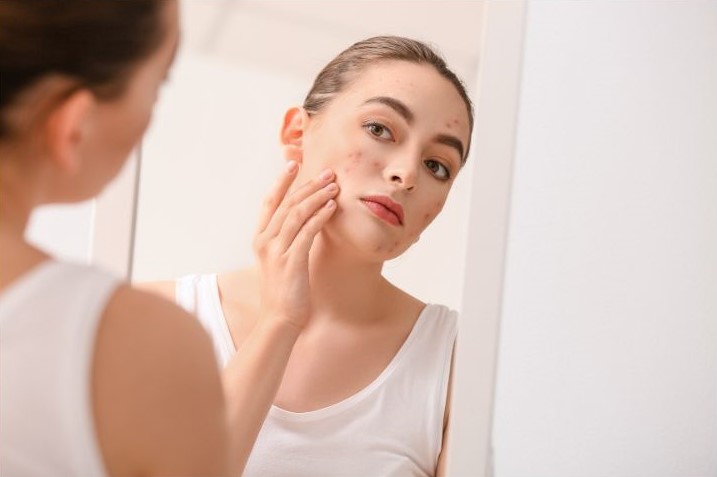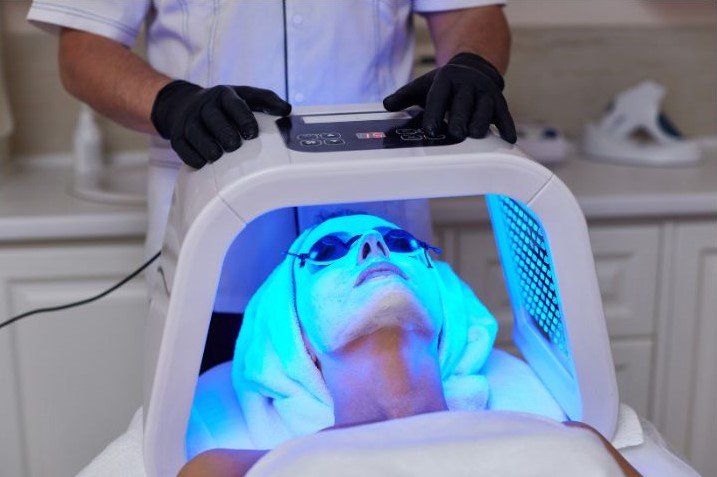Dealing with acne can be challenging, but there are several strategies and treatments that can help manage and reduce breakouts. Here are some steps you can take:

Daily Skincare Routine
Cleansing:
Use a gentle cleanser twice a day (morning and night) to remove dirt, oil, and makeup. Avoid harsh soaps that can strip your skin of natural oils.
Consider using a cleanser with salicylic acid or benzoyl peroxide if you have oily or acne-prone skin.
Moisturizing:
Apply a non-comedogenic (won’t clog pores) moisturizer to keep your skin hydrated. Look for products labelled “oil-free” or “for acne-prone skin.”
Sun Protection:
Use a broad-spectrum sunscreen with at least SPF 30 daily to protect your skin from UV damage, which can worsen acne and cause hyperpigmentation.
Over-the-Counter Treatments
Benzoyl Peroxide:
Helps to kill bacteria that cause acne and reduces inflammation. Available in various strengths (2.5%, 5%, and 10%).
Salicylic Acid:
Helps to exfoliate the skin and unclog pores, reducing the formation of acne.
Retinoids:
Over-the-counter retinoids (like adapalene) can help unclog pores and promote cell turnover.
Prescription Treatments
Topical Treatments:
Prescription-strength retinoids, antibiotics, or combination products can be more effective for severe acne.
Oral Medications:
- Oral antibiotics can help reduce bacteria and inflammation.
- Hormonal treatments, such as birth control pills or spironolactone, can be effective for women with hormonally driven acne.
- Isotretinoin (Accutane) is a powerful oral medication used for severe acne that hasn’t responded to other treatments.
Lifestyle and Home Remedies
Diet:
Some studies suggest that reducing intake of high-glycemic foods (like sugary snacks) and dairy may help reduce acne.
Stress Management:
Stress can exacerbate acne, so practices like meditation, exercise, and adequate sleep can be beneficial.
Hydration:
Drink plenty of water to help keep your skin hydrated and flush out toxins.
Avoid Touching Your Face:
Try not to touch your face frequently, as this can transfer oils and bacteria from your hands to your skin.
Professional Treatments
Chemical Peels:
Professional-grade peels can help reduce acne and improve skin texture.
Laser and Light Therapy:
Treatments like blue light therapy can target acne-causing bacteria.
Extraction:
A dermatologist can safely remove blackheads and whiteheads.

When to See a Dermatologist
If your acne is severe, persistent, or causing significant distress, it’s a good idea to consult a dermatologist. They can provide a tailored treatment plan and monitor your progress.
Final Tips
- Be patient and consistent with your skincare routine; it can take several weeks to see improvement.
- Avoid using too many acne treatments at once, as this can irritate your skin.
- Follow the instructions on any medication or product you use to avoid overuse and potential side effects.
By combining a consistent skincare routine with appropriate treatments, you can effectively manage and reduce acne.
Share This Story, Choose Your Platform!
Let’s Stay In Touch
Let’s Stay In Touch
Subscribe to the Gam-Med’s newsletter to stay in the know of changes, events, new policies and procedures.




